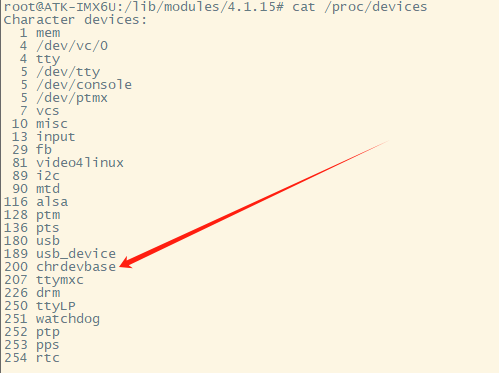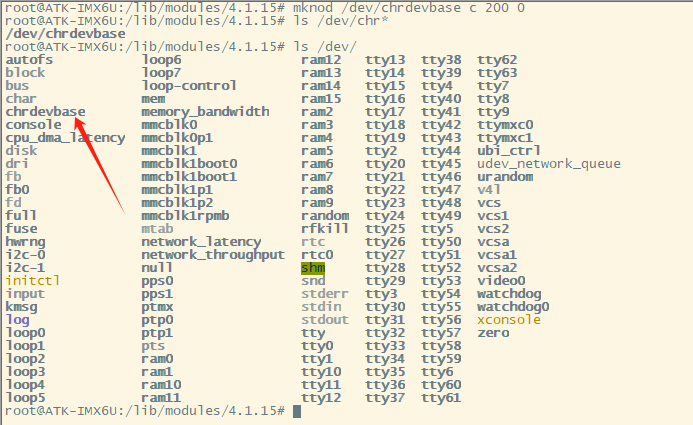驱动模块的加载与卸载
insmod xxx.ko //加载驱动模块
rmmod xxx.ko //卸载驱动模块
module_init(xxx_init);//注册模块加载函数
module_exit(xxx_exit);//注册模块卸载函数使用insmod命令加载驱动模块,在调用insmod命令时候,驱动中的mudule_init();函数就会被调用。
使用rmmod命令卸载驱动模块,在调用rmmod命令时,驱动中的module_exit();函数就会被调用。
问题1:linux系统如何知道mudule_init()和module_exit()是驱动的入口函数和出口函数?
答案:mudule_init()需要用"__init"来修饰,module_exit()需要用"__exit"来修饰。
问题2:驱动的入口函数和出口函数为何要用ststic修饰?
答案:static修饰后的函数为静态函数,它不能被其他文件所用,起隔离作用。
所以字符驱动设备模块加载和卸载函数的模板如下
/*驱动入口*/
static int __init xxxx_init(void)
{
/*填入具体内容*/
return 0;
}
/*驱动出口*/
static void __exit xxxx_exit(void)
{
/*填入具体内容*/
}
/*指定模块的入口函数和出口函数*/
module_init(xxxx_init);
module_exit(xxxx_exit);字符设备的注册与注销
当调用insmod命令加载设备驱动时,module_init会调用执行xxxx_init;那么怎么能让系统知道我们加载了一个什么驱动。则就需要进行驱动的注册。同理,我们卸载驱动时,也需要进行驱动的注销
函数原型如下:
static inline init register_chrdev(unsigned int major, const char *name, const struct file_operations *fops);
static inline void unregister_chrdev(unsigned int major, const char *name);各个参数的意义如下:
- major:主设备号
- name:设备名称
- fops:结构体 file_operation类型指针(后面再详细写)
字符设备的注册与注销模板如下
static struct file_operations xxx_fops
static int __init xxx_init(void)
{
int retvalue = 0;
retvalue = register_chrdev(200, "xxx", &xxx_fops);
if(retvalue < 0){
return -1;
}
return 0;
}
static void __exit xxx_exit(void)
{
unregister_chrdev(200, "xxx");
}
module_init(xxx_init);
module_exit(xxx_exit);file_operation结构体介绍
struct file_operations {
struct module *owner;
ssize_t (*write) (struct file *, const char __user *, size_t, loff_t *);
ssize_t (*read) (struct file *, char __user *, size_t, loff_t *);
int (*open) (struct inode *, struct file *);
int (*release) (struct inode *, struct file *);
......//省略其他
};- owner拥有该结构体的模块的指针,一般设置为THIS_MODULE
- write函数用于向设备文件写入(发送数据)
- read函数用于读取设备文件
- open函数用于打开设备文件
- release函数用于释放(关闭)设备文件
- 其他的后面再做笔记
在linux中一切皆文件,驱动加载成功后,会在/dev目录下生成一个相应的文件,应用程序通过访问这个名为/dev/xxx的文件实现对驱动的控制。一般对文件的操作有open、close、write、read。
以open函数为例,我们在应用程序中调用open函数,这个函数是C库提供给应用使用的,C库则会通过系统调用陷入到内核中调用驱动的open函数
所以我们要在驱动中实现file_operations中的write、read、open、release函数。通过注册设备函数提供给系统,供应用使用。
设备具体操作函数具体实现
/*打开设备*/
// inode:传递给驱动的inode
// filp:设备文件
static int xxx_open(struct inode *inode, struct file *filp)
{
/*用户实现具体功能*/
return 0;
}/*关闭设备*/
// inode:传递给驱动的inode
// filp:设备文件
static int xxx_release(struct inode *inode, struct file *filp)
{
/*用户实现具体功能*/
return 0;
}/*从设备读取*/
// filp:要打开的设备文件(文件描述符)
// buf:返回给用户空间的数据缓冲区
// cnt:要读取的数据长度
// offt:相对于文件首地址的偏移
static ssize_t xxx_read(struct file *filp, char __user *buf, size_t cnt, loff_t *offt)
{
/*用户实现具体功能*/
return 0;
}/*从设备读取*/
// file:设备文件
// buf:要写入设备的数据
// cnt:写入的数据长度
// offt:相对于文件首地址的偏移
static ssize_t xxx_write(struct file *filp, const char __user *buf, size_t cnt, loff_t *offt)
{
/*用户实现具体功能*/
return 0;
}添加LICENSE和作者信息
MODULE_LICENSE() //添加模块 LICENSE 信息
MODULE_AUTHOR() //添加模块作者信息许可信息填写GPL,作者信息填写自己的即可, LICENSE 是必须添加的,否则的话编译的时候会报错,作者信息可以添加也可以不添加。
file_operations结构体变量的实现
我们虽然定义的file_operations xxx_fops。并且xxx_fops可以通过注册设备函数传递给系统,但是xxx_fops是个空的,需要我们初始化它。结构如下。
static struct file_operations xxx_fops = {
.owner = THIS_MODULE,
.open = xxx_open,
.read = xxx_read,
.write = xxx_write,
.release = xxx_release,
};
其中.owner固定赋值为THIS_MODULE
至此驱动部门完成了,具体实现代码如下。
#include <linux/types.h>
#include <linux/kernel.h>
#include <linux/delay.h>
#include <linux/ide.h>
#include <linux/init.h>
#include <linux/module.h>
#define CHRDEVBASE_MAJOR 200
#define CHRDEVBASE_NAME "chrdevbase"
static char readbuf[1024];
static char writebuf[1024];
static char kerneldata[1024]={0};
static int chrdevbase_open(struct inode *inode, struct file *filp)
{
printk("chrdevbase open!\r\n");
return 0;
}
static ssize_t chrdevbase_read(struct file *filp, char __user *buf, size_t cnt, loff_t *offt)
{
int retvalue = 0;
if(cnt <= 1024){
memcpy(readbuf, kerneldata, cnt);
retvalue = copy_to_user(buf, readbuf, cnt);
}else{
memcpy(readbuf, kerneldata, 1024);
retvalue = copy_to_user(buf, readbuf, 1024);
}
if(retvalue == 0){
printk("kernel senddata success!\r\n");
}else{
printk("kernel senddata failed!\r\n");
}
return 0;
}
static ssize_t chrdevbase_write(struct file *filp, const char __user *buf, size_t cnt, loff_t *offt)
{
int retvalue = 0;
if(cnt <= 1024){
retvalue = copy_from_user(writebuf, buf, cnt);
}else{
retvalue = copy_from_user(writebuf, buf, 1024);
}
memcpy(kerneldata, writebuf, strlen(writebuf));
if(retvalue == 0){
printk("kernel receive data success!\r\n");
}else{
printk("kernel receive data failed!\r\n");
}
return 0;
}
static int chrdevbase_release(struct inode *inode, struct file *filp)
{
// printk("chrdevbase release!\r\n");
return 0;
}
static struct file_operations chrdevbase_fops = {
.owner = THIS_MODULE,
.open = chrdevbase_open,
.release = chrdevbase_release,
.read = chrdevbase_read,
.write = chrdevbase_write
};
static int __init chrdevbase_init(void)
{
int retvalue = 0;
retvalue = register_chrdev(CHRDEVBASE_MAJOR, CHRDEVBASE_NAME, &chrdevbase_fops);
if(retvalue == 0){
printk("chrdevbase init success\r\n");
}else{
printk("chrdevbase init failed\r\n");
}
return 0;
}
static void __exit chrdevbase_exit(void)
{
unregister_chrdev(CHRDEVBASE_MAJOR, CHRDEVBASE_NAME);
printk("chrdevbase exit success!\r\n");
}
module_init(chrdevbase_init);
module_exit(chrdevbase_exit);
MODULE_LICENSE("GPL");
MODULE_AUTHOR("warren");测试软件代码如下
#include "stdio.h"
#include "unistd.h"
#include "sys/types.h"
#include "sys/stat.h"
#include "fcntl.h"
#include "stdlib.h"
#include "string.h"
static char usrdata[]={"usr data!"};
int main(int argc, int **argv)
{
int fd, retvalue;
char *filename;
char readbuf[1024];
char writebuf[1024];
if(atoi(argv[2]) == 1){
if(argc != 3){
printf("Error Usage!\r\n");
return -1;
}
}else{
if(argc != 4){
printf("Error Usage!\r\n");
return -1;
}
}
filename = argv[1];
fd = open(filename, O_RDWR);
if(fd < 0){
printf("Can't open %s\r\n", filename);
}
if(atoi(argv[2]) == 1){
retvalue = read(fd, readbuf, 1024);
if(retvalue != 0){
printf("read file %s failed\r\n", filename);
return -1;
}else{
printf("read data: %s\r\n", readbuf);
}
}
else if (atoi(argv[2]) == 2){
memcpy(writebuf, argv[3], strlen(argv[3]));
retvalue = write(fd, writebuf, strlen(argv[3]));
if(retvalue != 0){
printf("write file %s failed!\r\n", filename);
}else{
printf("write data %s success!\r\n", argv[3]);
}
}
retvalue = close(fd);
if(retvalue != 0){
printf("Can't Close file %s\r\n", filename);
return -1;
}
return 0;
}驱动程序和应用程序编译
//编译驱动模块的MAKEFILE文件
KERNELDIR := /home/warren/linux/linux_source_code/linux-imx-rel_imx_4.1.15_2.1.0_ga_alientek
CURRENTDIR := $(shell pwd)
obj-m := chrdevbase.o
build: kernel_modules
kernel_modules:
$(MAKE) -C $(KERNELDIR) M=$(CURRENTDIR) modules
clean:
$(MAKE) -C $(KERNELDIR) M=$(CURRENTDIR) cleanMAKEFILE知识后面再补吧,先暂时当一下烂娃。
编译驱动模块和应用的脚本及拷贝到tftp文件夹,准备让开发板获取。
#!/bin/bash
make clean
make
rm -rf chrdevbaseApp
arm-linux-gnueabihf-gcc chrdevbaseApp.c -o chrdevbaseApp
rm -rf ../../tftpboot/*
cp c*App *.ko ../../tftpboot
chmod 777 ../../tftpboot/*测试及验证
进入在开发板的根文件系统/lib/modules/4.1.15文件夹
使用tftp命令获取chrdevbase.ko文件和chrdevbaseApp文件
tftp -g -r chrdevbase.ko 192.168.0.100
tftp -g -r chrdevbaseApp 192.168.0.100给chrdevbaseApp权限
chmod 777 chrdevbaseApp使用insmod命令加载驱动模块
insmod chrdevbase.ko
查看当前系统中的所有设备
ccat /proc/devices
创建设备节点文件
mknod /dev/chrdevbase c 200 0
// mknod:创建节点命令
// /dev/chrdevbase:要创建的节点文件
// c:代表字符
// 200: 主设备号
// 0:次设备号查看/dev/下的节点文件
下来调用chrdevbaseApp来对/dev/chedevbase这个节点文件进行操作。
./chrdevbaseApp /dev/chrdevbase 2 warren
./chrdevbaseApp /dev/chrdevbase 1
结束,撒花!!! 



评论 (0)